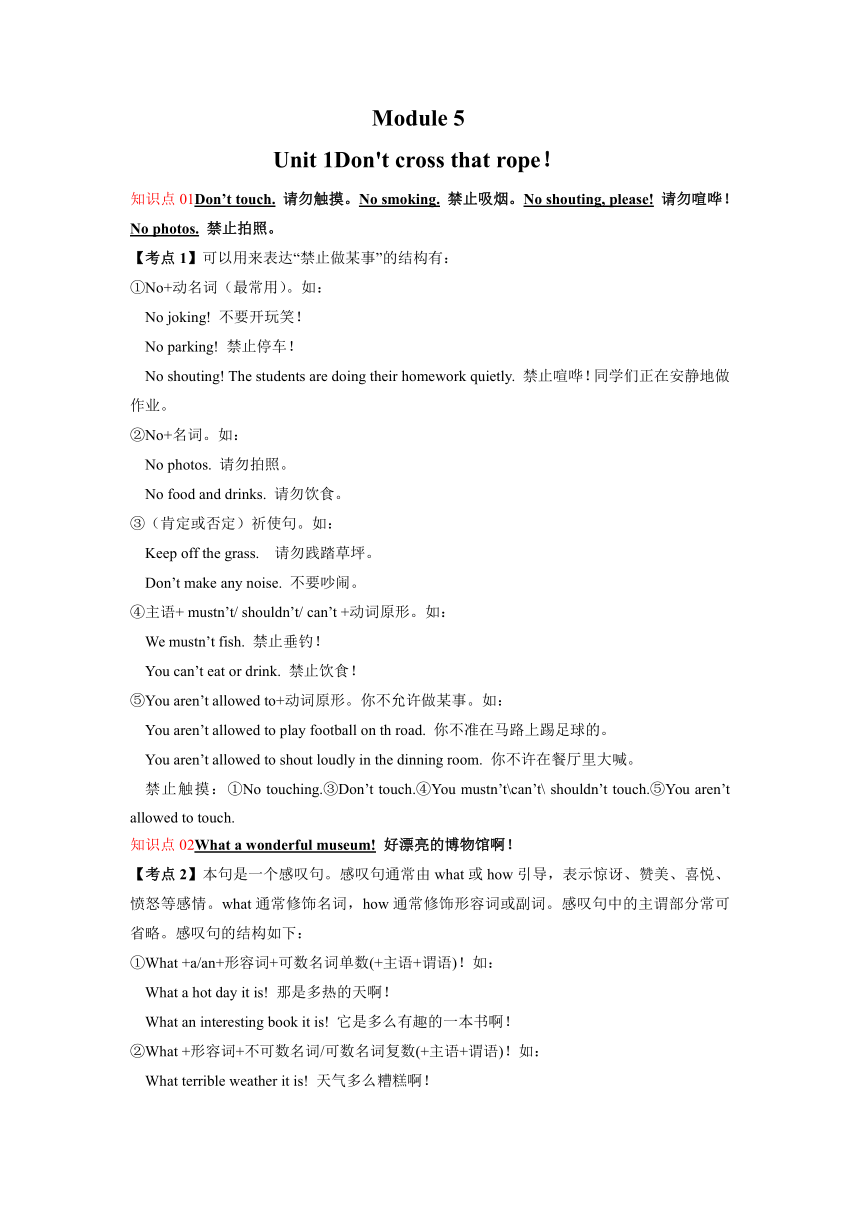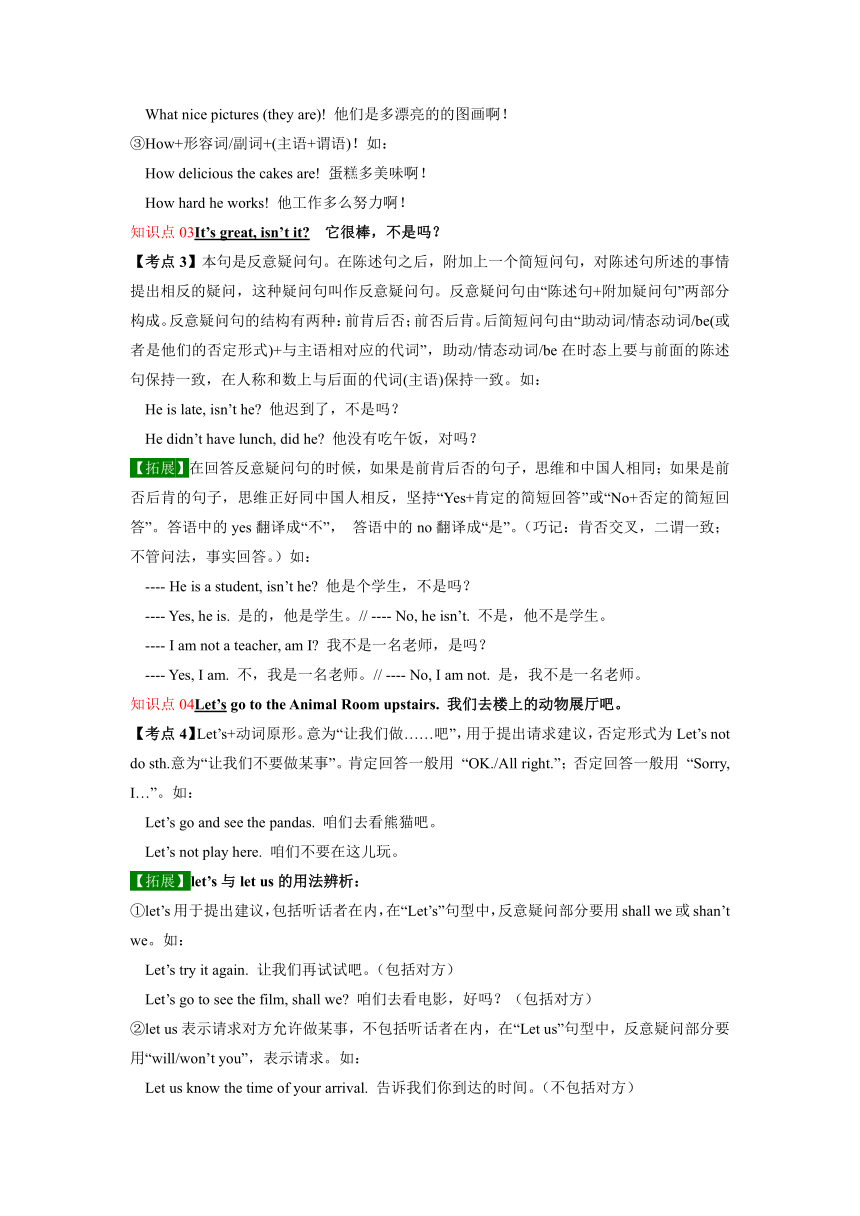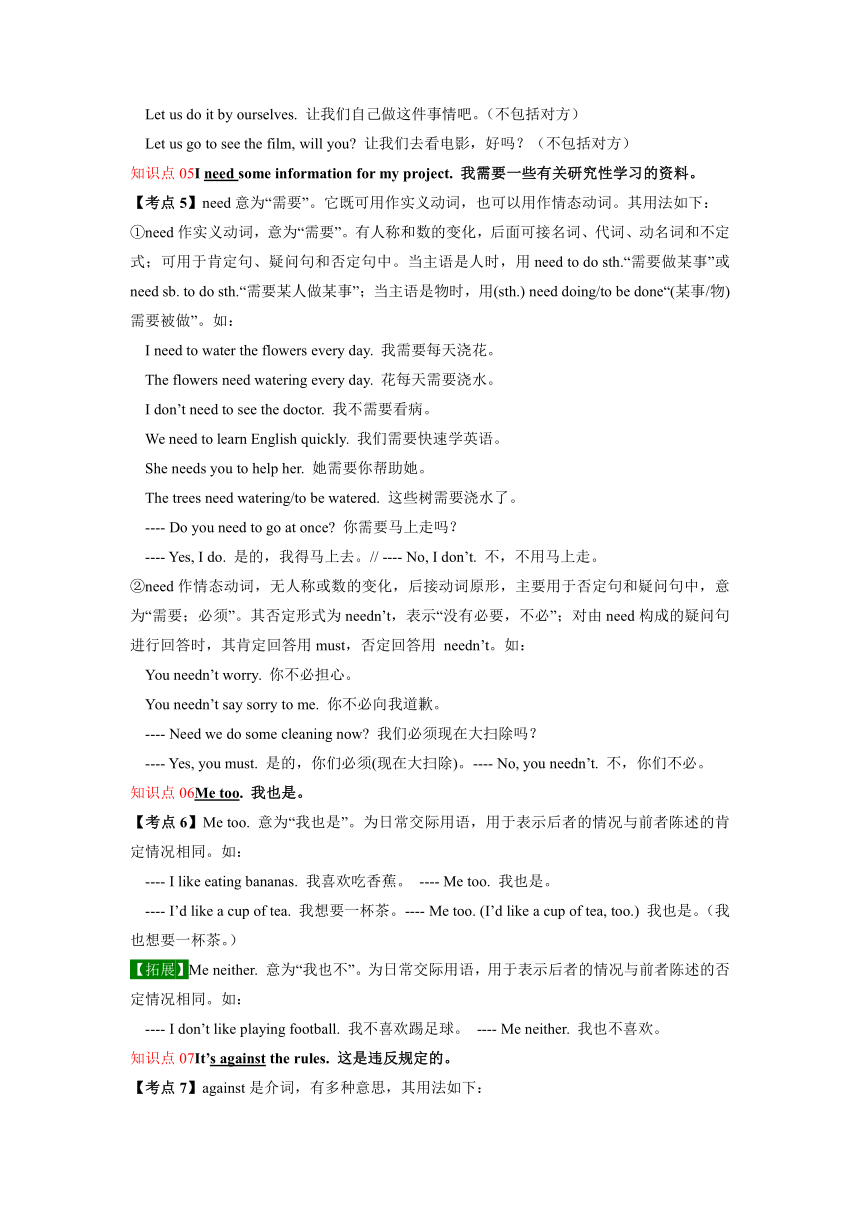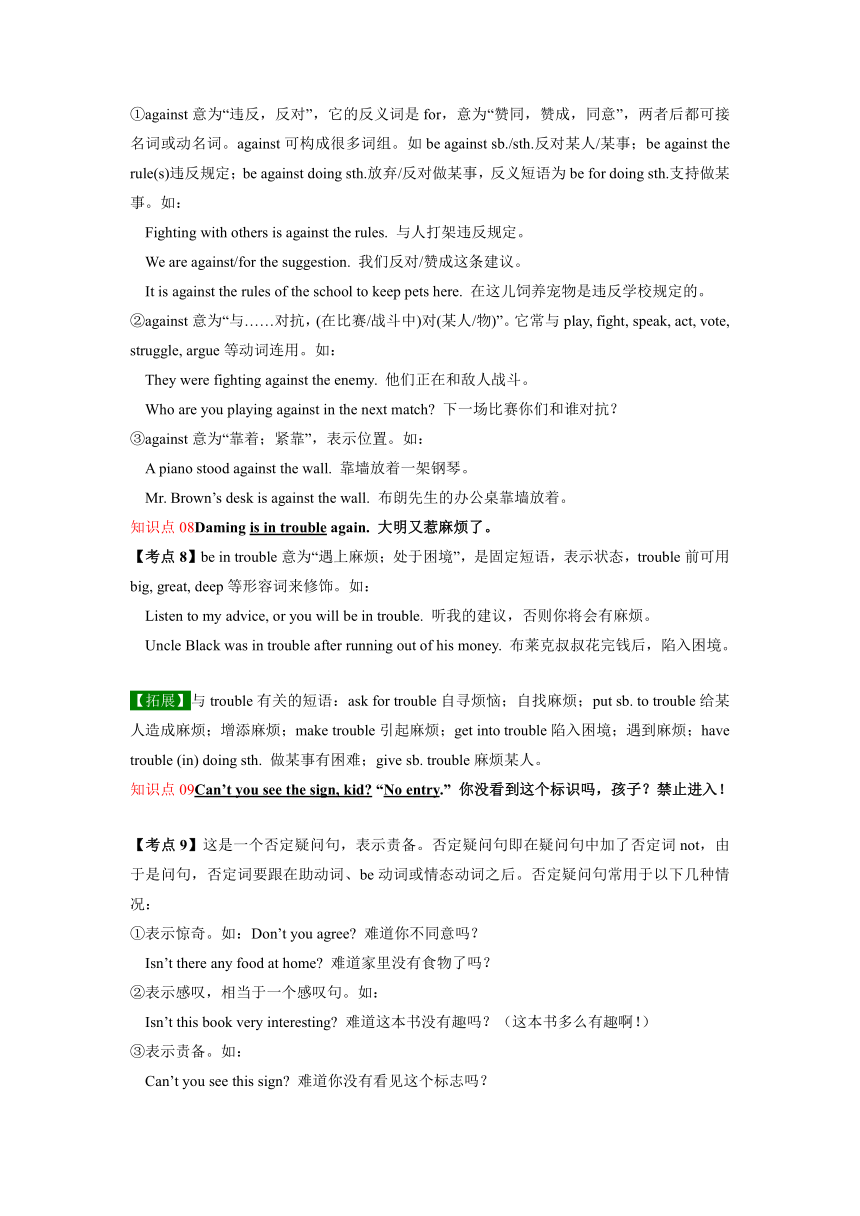外研版九年级上册 Module 5 Unit 1 Don't cross that rope! 重点知识归纳和语法 讲解练习(含答案)
文档属性
| 名称 | 外研版九年级上册 Module 5 Unit 1 Don't cross that rope! 重点知识归纳和语法 讲解练习(含答案) |  | |
| 格式 | zip | ||
| 文件大小 | 2.3MB | ||
| 资源类型 | 教案 | ||
| 版本资源 | 外研版 | ||
| 科目 | 英语 | ||
| 更新时间 | 2023-01-16 21:04:57 | ||
图片预览




文档简介
Module 5
Unit 1Don't cross that rope!
知识点01Don’t touch. 请勿触摸。No smoking. 禁止吸烟。No shouting, please! 请勿喧哗!No photos. 禁止拍照。
【考点1】可以用来表达“禁止做某事”的结构有:
①No+动名词(最常用)。如:
No joking! 不要开玩笑!
No parking! 禁止停车!
No shouting! The students are doing their homework quietly. 禁止喧哗!同学们正在安静地做作业。
②No+名词。如:
No photos. 请勿拍照。
No food and drinks. 请勿饮食。
③(肯定或否定)祈使句。如:
Keep off the grass. 请勿践踏草坪。
Don’t make any noise. 不要吵闹。
④主语+ mustn’t/ shouldn’t/ can’t +动词原形。如:
We mustn’t fish. 禁止垂钓!
You can’t eat or drink. 禁止饮食!
⑤You aren’t allowed to+动词原形。你不允许做某事。如:
You aren’t allowed to play football on th road. 你不准在马路上踢足球的。
You aren’t allowed to shout loudly in the dinning room. 你不许在餐厅里大喊。
禁止触摸:①No touching.③Don’t touch.④You mustn’t\can’t\ shouldn’t touch.⑤You aren’t allowed to touch.
知识点02What a wonderful museum! 好漂亮的博物馆啊!
【考点2】本句是一个感叹句。感叹句通常由what或how引导,表示惊讶、赞美、喜悦、愤怒等感情。what通常修饰名词,how通常修饰形容词或副词。感叹句中的主谓部分常可省略。感叹句的结构如下:
①What +a/an+形容词+可数名词单数(+主语+谓语)!如:
What a hot day it is! 那是多热的天啊!
What an interesting book it is! 它是多么有趣的一本书啊!
②What +形容词+不可数名词/可数名词复数(+主语+谓语)!如:
What terrible weather it is! 天气多么糟糕啊!
What nice pictures (they are)! 他们是多漂亮的的图画啊!
③How+形容词/副词+(主语+谓语)!如:
How delicious the cakes are! 蛋糕多美味啊!
How hard he works! 他工作多么努力啊!
知识点03It’s great, isn’t it 它很棒,不是吗?
【考点3】本句是反意疑问句。在陈述句之后,附加上一个简短问句,对陈述句所述的事情提出相反的疑问,这种疑问句叫作反意疑问句。反意疑问句由“陈述句+附加疑问句”两部分构成。反意疑问句的结构有两种:前肯后否;前否后肯。后简短问句由“助动词/情态动词/be(或者是他们的否定形式)+与主语相对应的代词”,助动/情态动词/be在时态上要与前面的陈述句保持一致,在人称和数上与后面的代词(主语)保持一致。如:
He is late, isn’t he 他迟到了,不是吗?
He didn’t have lunch, did he 他没有吃午饭,对吗?
【拓展】在回答反意疑问句的时候,如果是前肯后否的句子,思维和中国人相同;如果是前否后肯的句子,思维正好同中国人相反,坚持“Yes+肯定的简短回答”或“No+否定的简短回答”。答语中的yes翻译成“不”, 答语中的no翻译成“是”。(巧记:肯否交叉,二谓一致;不管问法,事实回答。)如:
---- He is a student, isn’t he 他是个学生,不是吗?
---- Yes, he is. 是的,他是学生。// ---- No, he isn’t. 不是,他不是学生。
---- I am not a teacher, am I 我不是一名老师,是吗?
---- Yes, I am. 不,我是一名老师。// ---- No, I am not. 是,我不是一名老师。
知识点04Let’s go to the Animal Room upstairs. 我们去楼上的动物展厅吧。
【考点4】Let’s+动词原形。意为“让我们做……吧”,用于提出请求建议,否定形式为Let’s not do sth.意为“让我们不要做某事”。肯定回答一般用 “OK./All right.”;否定回答一般用 “Sorry, I…”。如:
Let’s go and see the pandas. 咱们去看熊猫吧。
Let’s not play here. 咱们不要在这儿玩。
【拓展】let’s与let us的用法辨析:
①let’s用于提出建议,包括听话者在内,在“Let’s”句型中,反意疑问部分要用shall we或shan’t we。如:
Let’s try it again. 让我们再试试吧。(包括对方)
Let’s go to see the film, shall we 咱们去看电影,好吗?(包括对方)
②let us表示请求对方允许做某事,不包括听话者在内,在“Let us”句型中,反意疑问部分要用“will/won’t you”,表示请求。如:
Let us know the time of your arrival. 告诉我们你到达的时间。(不包括对方)
Let us do it by ourselves. 让我们自己做这件事情吧。(不包括对方)
Let us go to see the film, will you 让我们去看电影,好吗?(不包括对方)
知识点05I need some information for my project. 我需要一些有关研究性学习的资料。
【考点5】need意为“需要”。它既可用作实义动词,也可以用作情态动词。其用法如下:
①need作实义动词,意为“需要”。有人称和数的变化,后面可接名词、代词、动名词和不定式;可用于肯定句、疑问句和否定句中。当主语是人时,用need to do sth.“需要做某事”或need sb. to do sth.“需要某人做某事”;当主语是物时,用(sth.) need doing/to be done“(某事/物)需要被做”。如:
I need to water the flowers every day. 我需要每天浇花。
The flowers need watering every day. 花每天需要浇水。
I don’t need to see the doctor. 我不需要看病。
We need to learn English quickly. 我们需要快速学英语。
She needs you to help her. 她需要你帮助她。
The trees need watering/to be watered. 这些树需要浇水了。
---- Do you need to go at once 你需要马上走吗?
---- Yes, I do. 是的,我得马上去。// ---- No, I don’t. 不,不用马上走。
②need作情态动词,无人称或数的变化,后接动词原形,主要用于否定句和疑问句中,意为“需要;必须”。其否定形式为needn’t,表示“没有必要,不必”;对由need构成的疑问句进行回答时,其肯定回答用must,否定回答用 needn’t。如:
You needn’t worry. 你不必担心。
You needn’t say sorry to me. 你不必向我道歉。
---- Need we do some cleaning now 我们必须现在大扫除吗?
---- Yes, you must. 是的,你们必须(现在大扫除)。---- No, you needn’t. 不,你们不必。
知识点06Me too. 我也是。
【考点6】Me too. 意为“我也是”。为日常交际用语,用于表示后者的情况与前者陈述的肯定情况相同。如:
---- I like eating bananas. 我喜欢吃香蕉。 ---- Me too. 我也是。
---- I’d like a cup of tea. 我想要一杯茶。---- Me too. (I’d like a cup of tea, too.) 我也是。(我也想要一杯茶。)
【拓展】Me neither. 意为“我也不”。为日常交际用语,用于表示后者的情况与前者陈述的否定情况相同。如:
---- I don’t like playing football. 我不喜欢踢足球。 ---- Me neither. 我也不喜欢。
知识点07It’s against the rules. 这是违反规定的。
【考点7】against是介词,有多种意思,其用法如下:
①against意为“违反,反对”,它的反义词是for,意为“赞同,赞成,同意”,两者后都可接名词或动名词。against可构成很多词组。如be against sb./sth.反对某人/某事;be against the rule(s)违反规定;be against doing sth.放弃/反对做某事,反义短语为be for doing sth.支持做某事。如:
Fighting with others is against the rules. 与人打架违反规定。
We are against/for the suggestion. 我们反对/赞成这条建议。
It is against the rules of the school to keep pets here. 在这儿饲养宠物是违反学校规定的。
②against意为“与……对抗,(在比赛/战斗中)对(某人/物)”。它常与play, fight, speak, act, vote, struggle, argue等动词连用。如:
They were fighting against the enemy. 他们正在和敌人战斗。
Who are you playing against in the next match 下一场比赛你们和谁对抗?
③against意为“靠着;紧靠”,表示位置。如:
A piano stood against the wall. 靠墙放着一架钢琴。
Mr. Brown’s desk is against the wall. 布朗先生的办公桌靠墙放着。
知识点08Daming is in trouble again. 大明又惹麻烦了。
【考点8】be in trouble意为“遇上麻烦;处于困境”,是固定短语,表示状态,trouble前可用big, great, deep等形容词来修饰。如:
Listen to my advice, or you will be in trouble. 听我的建议,否则你将会有麻烦。
Uncle Black was in trouble after running out of his money. 布莱克叔叔花完钱后,陷入困境。
【拓展】与trouble有关的短语:ask for trouble自寻烦恼;自找麻烦;put sb. to trouble给某人造成麻烦;增添麻烦;make trouble引起麻烦;get into trouble陷入困境;遇到麻烦;have trouble (in) doing sth. 做某事有困难;give sb. trouble麻烦某人。
知识点09Can’t you see the sign, kid “No entry.” 你没看到这个标识吗,孩子?禁止进入!
【考点9】这是一个否定疑问句,表示责备。否定疑问句即在疑问句中加了否定词not,由于是问句,否定词要跟在助动词、be动词或情态动词之后。否定疑问句常用于以下几种情况:
①表示惊奇。如:Don’t you agree 难道你不同意吗?
Isn’t there any food at home 难道家里没有食物了吗?
②表示感叹,相当于一个感叹句。如:
Isn’t this book very interesting 难道这本书没有趣吗?(这本书多么有趣啊!)
③表示责备。如:
Can’t you see this sign 难道你没有看见这个标志吗?
【考点10】No entry意为“禁止进入”。“No+名词”,可以用来表达“禁止做某事”。如:
No photos. 请勿拍照。
No food and drinks. 请勿饮食。
知识点10That’s no good! Well, I’ll just take a photo... 太不好了!嗯,那我就拍张照片……
【考点11】no good意为“无益,没有好处;不合适的;不方便的”。句型:It’s no good doing sth.意为“做某事没有益处”。如:It’s no good going there. 去那儿没有好处。
---- Let’s ask Tom not to speak loudly here. 让我们叫汤姆不要在这里大声说话。
---- That’s no good! He is too difficult. 没有用!他太难对付了。
知识点11No wonder the place is empty! 难怪这个地方没什么人呢!
【考点12】no wonder是It’s no wonder that的省略形式,意为“难怪;不足为奇”。当我们对某事并不十分了解,但经对方一番解说后感到茅塞顿开时,就可以使用本句。如果你想表达更加具体的含义的话,就在后面加完整的句子。如:
No wonder you look so upset. 难怪你这么沮丧。
It rained quite heavily. No wonder you were late! 雨下得太大了。难怪你来晚了!
It’s no wonder that the earth is becoming warmer and warmer. 难怪地球变得越来越温暖了。
知识点12What’s the matter, Lingling 怎么了,玲玲?
【考点13】What’s the matter 意为“怎么了?出了什么事情?”,常用于询问某人有什么病或某人遇到什么麻烦或问题。其后跟询问对象时,与介词with连用。同义表达方式有:①What’s up ②What’s the trouble (with...) ③What’s wrong (with...) ④What has happened (to) 如:
---- What’s the matter with her 她怎么啦?---- She had a bad cold. 她患了重感冒。
---- What’s the matter with your bike 你的自行车怎么啦?---- It’s broken. 摔坏了。
知识点13I have to find it, or Mum will punish me! 我一定要找到它,要不然妈妈会处罚我的!
【考点14】or意为“否则”,表示一种否定的条件,用于警告或忠告。如:
Hurry up, or you’ll be late for school. 赶快,否则你上学就要迟到了。
【拓展】or还可以表示选择,意为“或”“还是”。如:Would you prefer tea or coffee 你喜欢茶还是咖啡?
【考点15】punish意为“惩罚;惩处”,其名词形式为punishment意为“惩罚;惩处”。常用结构:punish sb. for sth./doing sth.意为“某人因……而受到惩罚/处罚”。如:
He was punished for being late. 他因迟到而受到处罚。
He was punished for being rude to his teacher. 他因对他的老师无礼而受到惩罚。
We will be punished if we break the the law. 如果我们违反了法律,就会受到惩罚。
知识点14..., but Daming got into trouble at the monkey exhibition. ……,但是大明在看猴展时遇到了麻烦。
【考点16】get into trouble意为“惹麻烦;遇到麻烦”,表示动作,trouble是不可数名词,意为“烦恼;麻烦”。如:
Nobody likes to get into trouble. 没有谁愿意惹麻烦。
Don’t mention my name, or you’ll get me into trouble. 别提我的名字,否则你会给我惹麻烦。
知识点15There he is. 他在那里!
【考点17】本句是倒装句。在英语中,以副词here, there开头的句子常用完全倒装句,主语为名词时,谓语要放在主语的前面,引起完全倒装,动词的单复数取决于主语;主语为代词时,不用倒装。倒装句主要作用是强调被提前的部分。如:
Here comes the bus. 公共汽车来了。// Here she comes. 她来了。
知识点16My mobile phone! It’s missing! 我的手机!我的手机不见了!
【考点18】【辨析】missing,lost与gone的用法辨析:三者都可表“失去”。
①lost意为“丢失”,含有“难以找回”的意思,可作定语、表语或宾语补足语。如:
Look! She is looking for her lost key. 看! 她正在寻找丢失的钥匙。
Lost time will never be found again. 失去的时间永远不会再被找回。
②missing意为“失踪了,不见了”,强调某人或物不在原处,暂时找不着了(含最终可能找到之意),可作定语、表语或宾语补足语。如:
They set out to look for the missing girl at once. 他们立即出发去寻找丢失的女孩。
His pen was missing, but he found it just now. 他的钢笔不见了,但是他刚刚找到它了。
③gone意为“(东西)没了;(时间)过去了;(人)死了”,而且语气肯定,作表语或宾语补足语,不可以作定语。如:
My fever is gone, but I still have a cough. 发烧消退了,但我仍然咳嗽。
Her grandpa is gone, so her grandma lives alone. 她的爷爷去世了, 所以她奶奶独自生活。
题组A 基础过关练
Ⅰ.根据句意及汉语提示完成单词
1.We can't go along that road because the sign says “No (进入权)”.
2.Old Henry lives (在楼上)and his son is downstairs.
3.The monkey has a long (尾巴).
4.The (展览会)was a big success.
5.He gave a quick pull on the (粗绳).
6.In Mr Black's opinion,it's not a good idea to (惩罚)kids every time they make mistakes.
7.Celia, don't be so (粗鲁的)to your grandma.
【答案】1.entry2.upstairs3.tail4.exhibition5.rude
Ⅱ.从括号中选择适当的单词填空
1.We must keep quiet when we are in (library/libraries).
2.Tom's father is (punished/punishing)him for losing the keys now.
3.All the teachers have gone to a meeting.No wonder (anybody/nobody)is in the office.
4.As a citizen,we mustn't do anything _ (with/against)the law.
5.Tell that kid to stop (making/to make)so much noise.
【答案】1.libraries2.punishing3.nobody4.against5.making
题组B 能力提升练
A.用方框中所给单词或短语的适当形式填空。每词仅用一次。
1.—This box is too heavy for me to carry .
—I'll give you a hand.
2.If you are ,please call me at 72335611.
3.—They have a lot of at their house.
—So do I.
4.—Have you heard of the news about the Malaysian plane
—Of course,people all over the world want to know whether it is safe.
5.Granny often tells us not to others in our daily life.
【答案】1.upstairs2.in trouble3.rules4.missing5.punish
B.根据短文内容和括号内所给汉语意思,写出空白处各单词的正确形式(每空一词)。
A Visit to a Museum
Not long ago,our city built a new museum.The museum is great for people of all __6__(年龄).What's more,__7__(进入许可)to the museum is free.No __8__(难怪)a lot of people go to visit it.
Last Saturday,I went there.When I was standing in front of the museum,I was so excited.Before we entered it,our __9__(导游)told us that it was __10__(违反)the rules to take __11__(照片)or __12__(触摸)the paintings on the first floor.He said,“Don't break the rules,or someone will __13__(惩罚)you.So if you don't want to get into __14__(困境),you'd better __15__(遵守)the rules.”
【答案】6.ages7.entry8.wonder9.guide10.against11.photos12.touch13.punish14.trouble15.follow
题组C 培优拔尖练
American country music is also known as(被称为)country western music.It has a very long history.It comes from the folk songs of immigrants(移民)from Britain.
Country music uses simple music and words to express everyday feelings such as loneliness,love,and sadness.That is to say,country music describes life.It talks about friends and enemies,trucks and roads,farms and crops.People in many parts of the world like country music,because everyone can understand what the music is about.
Country western music became popular first among cowboys(牛仔)in the American west countryside.Cowboys had to take care of cows day and night.When they were alone with the cows,they often sang beautiful and peaceful songs to calm the animals and to overcome their own fear.They were not well-educated and so they sang about their daily life in very simple words.They played the guitar, the violin,and other instruments.In the south of America,many people added instruments from their homes,like bottles and spoons.When cowboys visited their friends and families on holidays like Thanksgiving,they usually sang and played country western music.
In recent years,many musicians have made country western music a little different from the one in the past.These changes make the songs sound even better.Today singers such as Carth Brooks,Reba McEntire,Emmylou Harris,Lyle Lovett,Eddie Rabbitt,LeAnn Rimes,Randy Travis,and a group called Alabama are singing and playing in different styles.They have brought country western music more and more fans from all over the world.
1.Country western music comes from the folk songs of immigrants from .
A.America B.France C.Britain D.Germany
2.According to the passage,people like American country music because .
A.it has a long history
B.it comes from Europe
C.it is sung by cowboys
D.it is easy to understand
3.The chunk“calm the animals”here means“make the animals become ”.
A.sad and lonely
B.quiet and relaxed
C.angry and wild
D.upset and scared
4.Which of these is mentioned in the passage
A.Early immigrants lived a very simple life.
B.Many country music singers are not well-educated.
C.Cowboys usually played country western music on holidays.
D.In the west of America,cowboys added instruments from their homes.
5.The best title(标题)for the passage is .
A.Americans Love American Country Music
B.The History of American Country Music
C.Singers and Fans of American Country Music
D.All Kinds of American Music,Yesterday and Today
1.【答案】C
【解析】细节理解题。由文章第一段最后一句可知:美国乡村音乐来自英国移民的民歌。
2.【答案】D
【解析】细节理解题。文章第二段最后一句告诉我们:世界上很多地方的人们都喜欢美国乡村音乐,因为每个人都可以理解这种音乐的内涵。因此可知:这种音乐容易理解。
3.【答案】B
【解析】词义猜测题。当这些牛仔单独和牛在一起的时候,他们经常唱一些动听和安静的歌曲,目的是使牛安静和放松。
4.【答案】C
【解析】细节理解题。由文章第三段最后一句可知:当牛仔在像感恩节这样的节日里去拜访朋友和家人的时候,他们通常会演唱和演奏西部乡村音乐。
5.【答案】B
【解析】主旨大意题。通读全文,不难发现,本文介绍了美国乡村音乐的历史。
Unit 1Don't cross that rope!
知识点01Don’t touch. 请勿触摸。No smoking. 禁止吸烟。No shouting, please! 请勿喧哗!No photos. 禁止拍照。
【考点1】可以用来表达“禁止做某事”的结构有:
①No+动名词(最常用)。如:
No joking! 不要开玩笑!
No parking! 禁止停车!
No shouting! The students are doing their homework quietly. 禁止喧哗!同学们正在安静地做作业。
②No+名词。如:
No photos. 请勿拍照。
No food and drinks. 请勿饮食。
③(肯定或否定)祈使句。如:
Keep off the grass. 请勿践踏草坪。
Don’t make any noise. 不要吵闹。
④主语+ mustn’t/ shouldn’t/ can’t +动词原形。如:
We mustn’t fish. 禁止垂钓!
You can’t eat or drink. 禁止饮食!
⑤You aren’t allowed to+动词原形。你不允许做某事。如:
You aren’t allowed to play football on th road. 你不准在马路上踢足球的。
You aren’t allowed to shout loudly in the dinning room. 你不许在餐厅里大喊。
禁止触摸:①No touching.③Don’t touch.④You mustn’t\can’t\ shouldn’t touch.⑤You aren’t allowed to touch.
知识点02What a wonderful museum! 好漂亮的博物馆啊!
【考点2】本句是一个感叹句。感叹句通常由what或how引导,表示惊讶、赞美、喜悦、愤怒等感情。what通常修饰名词,how通常修饰形容词或副词。感叹句中的主谓部分常可省略。感叹句的结构如下:
①What +a/an+形容词+可数名词单数(+主语+谓语)!如:
What a hot day it is! 那是多热的天啊!
What an interesting book it is! 它是多么有趣的一本书啊!
②What +形容词+不可数名词/可数名词复数(+主语+谓语)!如:
What terrible weather it is! 天气多么糟糕啊!
What nice pictures (they are)! 他们是多漂亮的的图画啊!
③How+形容词/副词+(主语+谓语)!如:
How delicious the cakes are! 蛋糕多美味啊!
How hard he works! 他工作多么努力啊!
知识点03It’s great, isn’t it 它很棒,不是吗?
【考点3】本句是反意疑问句。在陈述句之后,附加上一个简短问句,对陈述句所述的事情提出相反的疑问,这种疑问句叫作反意疑问句。反意疑问句由“陈述句+附加疑问句”两部分构成。反意疑问句的结构有两种:前肯后否;前否后肯。后简短问句由“助动词/情态动词/be(或者是他们的否定形式)+与主语相对应的代词”,助动/情态动词/be在时态上要与前面的陈述句保持一致,在人称和数上与后面的代词(主语)保持一致。如:
He is late, isn’t he 他迟到了,不是吗?
He didn’t have lunch, did he 他没有吃午饭,对吗?
【拓展】在回答反意疑问句的时候,如果是前肯后否的句子,思维和中国人相同;如果是前否后肯的句子,思维正好同中国人相反,坚持“Yes+肯定的简短回答”或“No+否定的简短回答”。答语中的yes翻译成“不”, 答语中的no翻译成“是”。(巧记:肯否交叉,二谓一致;不管问法,事实回答。)如:
---- He is a student, isn’t he 他是个学生,不是吗?
---- Yes, he is. 是的,他是学生。// ---- No, he isn’t. 不是,他不是学生。
---- I am not a teacher, am I 我不是一名老师,是吗?
---- Yes, I am. 不,我是一名老师。// ---- No, I am not. 是,我不是一名老师。
知识点04Let’s go to the Animal Room upstairs. 我们去楼上的动物展厅吧。
【考点4】Let’s+动词原形。意为“让我们做……吧”,用于提出请求建议,否定形式为Let’s not do sth.意为“让我们不要做某事”。肯定回答一般用 “OK./All right.”;否定回答一般用 “Sorry, I…”。如:
Let’s go and see the pandas. 咱们去看熊猫吧。
Let’s not play here. 咱们不要在这儿玩。
【拓展】let’s与let us的用法辨析:
①let’s用于提出建议,包括听话者在内,在“Let’s”句型中,反意疑问部分要用shall we或shan’t we。如:
Let’s try it again. 让我们再试试吧。(包括对方)
Let’s go to see the film, shall we 咱们去看电影,好吗?(包括对方)
②let us表示请求对方允许做某事,不包括听话者在内,在“Let us”句型中,反意疑问部分要用“will/won’t you”,表示请求。如:
Let us know the time of your arrival. 告诉我们你到达的时间。(不包括对方)
Let us do it by ourselves. 让我们自己做这件事情吧。(不包括对方)
Let us go to see the film, will you 让我们去看电影,好吗?(不包括对方)
知识点05I need some information for my project. 我需要一些有关研究性学习的资料。
【考点5】need意为“需要”。它既可用作实义动词,也可以用作情态动词。其用法如下:
①need作实义动词,意为“需要”。有人称和数的变化,后面可接名词、代词、动名词和不定式;可用于肯定句、疑问句和否定句中。当主语是人时,用need to do sth.“需要做某事”或need sb. to do sth.“需要某人做某事”;当主语是物时,用(sth.) need doing/to be done“(某事/物)需要被做”。如:
I need to water the flowers every day. 我需要每天浇花。
The flowers need watering every day. 花每天需要浇水。
I don’t need to see the doctor. 我不需要看病。
We need to learn English quickly. 我们需要快速学英语。
She needs you to help her. 她需要你帮助她。
The trees need watering/to be watered. 这些树需要浇水了。
---- Do you need to go at once 你需要马上走吗?
---- Yes, I do. 是的,我得马上去。// ---- No, I don’t. 不,不用马上走。
②need作情态动词,无人称或数的变化,后接动词原形,主要用于否定句和疑问句中,意为“需要;必须”。其否定形式为needn’t,表示“没有必要,不必”;对由need构成的疑问句进行回答时,其肯定回答用must,否定回答用 needn’t。如:
You needn’t worry. 你不必担心。
You needn’t say sorry to me. 你不必向我道歉。
---- Need we do some cleaning now 我们必须现在大扫除吗?
---- Yes, you must. 是的,你们必须(现在大扫除)。---- No, you needn’t. 不,你们不必。
知识点06Me too. 我也是。
【考点6】Me too. 意为“我也是”。为日常交际用语,用于表示后者的情况与前者陈述的肯定情况相同。如:
---- I like eating bananas. 我喜欢吃香蕉。 ---- Me too. 我也是。
---- I’d like a cup of tea. 我想要一杯茶。---- Me too. (I’d like a cup of tea, too.) 我也是。(我也想要一杯茶。)
【拓展】Me neither. 意为“我也不”。为日常交际用语,用于表示后者的情况与前者陈述的否定情况相同。如:
---- I don’t like playing football. 我不喜欢踢足球。 ---- Me neither. 我也不喜欢。
知识点07It’s against the rules. 这是违反规定的。
【考点7】against是介词,有多种意思,其用法如下:
①against意为“违反,反对”,它的反义词是for,意为“赞同,赞成,同意”,两者后都可接名词或动名词。against可构成很多词组。如be against sb./sth.反对某人/某事;be against the rule(s)违反规定;be against doing sth.放弃/反对做某事,反义短语为be for doing sth.支持做某事。如:
Fighting with others is against the rules. 与人打架违反规定。
We are against/for the suggestion. 我们反对/赞成这条建议。
It is against the rules of the school to keep pets here. 在这儿饲养宠物是违反学校规定的。
②against意为“与……对抗,(在比赛/战斗中)对(某人/物)”。它常与play, fight, speak, act, vote, struggle, argue等动词连用。如:
They were fighting against the enemy. 他们正在和敌人战斗。
Who are you playing against in the next match 下一场比赛你们和谁对抗?
③against意为“靠着;紧靠”,表示位置。如:
A piano stood against the wall. 靠墙放着一架钢琴。
Mr. Brown’s desk is against the wall. 布朗先生的办公桌靠墙放着。
知识点08Daming is in trouble again. 大明又惹麻烦了。
【考点8】be in trouble意为“遇上麻烦;处于困境”,是固定短语,表示状态,trouble前可用big, great, deep等形容词来修饰。如:
Listen to my advice, or you will be in trouble. 听我的建议,否则你将会有麻烦。
Uncle Black was in trouble after running out of his money. 布莱克叔叔花完钱后,陷入困境。
【拓展】与trouble有关的短语:ask for trouble自寻烦恼;自找麻烦;put sb. to trouble给某人造成麻烦;增添麻烦;make trouble引起麻烦;get into trouble陷入困境;遇到麻烦;have trouble (in) doing sth. 做某事有困难;give sb. trouble麻烦某人。
知识点09Can’t you see the sign, kid “No entry.” 你没看到这个标识吗,孩子?禁止进入!
【考点9】这是一个否定疑问句,表示责备。否定疑问句即在疑问句中加了否定词not,由于是问句,否定词要跟在助动词、be动词或情态动词之后。否定疑问句常用于以下几种情况:
①表示惊奇。如:Don’t you agree 难道你不同意吗?
Isn’t there any food at home 难道家里没有食物了吗?
②表示感叹,相当于一个感叹句。如:
Isn’t this book very interesting 难道这本书没有趣吗?(这本书多么有趣啊!)
③表示责备。如:
Can’t you see this sign 难道你没有看见这个标志吗?
【考点10】No entry意为“禁止进入”。“No+名词”,可以用来表达“禁止做某事”。如:
No photos. 请勿拍照。
No food and drinks. 请勿饮食。
知识点10That’s no good! Well, I’ll just take a photo... 太不好了!嗯,那我就拍张照片……
【考点11】no good意为“无益,没有好处;不合适的;不方便的”。句型:It’s no good doing sth.意为“做某事没有益处”。如:It’s no good going there. 去那儿没有好处。
---- Let’s ask Tom not to speak loudly here. 让我们叫汤姆不要在这里大声说话。
---- That’s no good! He is too difficult. 没有用!他太难对付了。
知识点11No wonder the place is empty! 难怪这个地方没什么人呢!
【考点12】no wonder是It’s no wonder that的省略形式,意为“难怪;不足为奇”。当我们对某事并不十分了解,但经对方一番解说后感到茅塞顿开时,就可以使用本句。如果你想表达更加具体的含义的话,就在后面加完整的句子。如:
No wonder you look so upset. 难怪你这么沮丧。
It rained quite heavily. No wonder you were late! 雨下得太大了。难怪你来晚了!
It’s no wonder that the earth is becoming warmer and warmer. 难怪地球变得越来越温暖了。
知识点12What’s the matter, Lingling 怎么了,玲玲?
【考点13】What’s the matter 意为“怎么了?出了什么事情?”,常用于询问某人有什么病或某人遇到什么麻烦或问题。其后跟询问对象时,与介词with连用。同义表达方式有:①What’s up ②What’s the trouble (with...) ③What’s wrong (with...) ④What has happened (to) 如:
---- What’s the matter with her 她怎么啦?---- She had a bad cold. 她患了重感冒。
---- What’s the matter with your bike 你的自行车怎么啦?---- It’s broken. 摔坏了。
知识点13I have to find it, or Mum will punish me! 我一定要找到它,要不然妈妈会处罚我的!
【考点14】or意为“否则”,表示一种否定的条件,用于警告或忠告。如:
Hurry up, or you’ll be late for school. 赶快,否则你上学就要迟到了。
【拓展】or还可以表示选择,意为“或”“还是”。如:Would you prefer tea or coffee 你喜欢茶还是咖啡?
【考点15】punish意为“惩罚;惩处”,其名词形式为punishment意为“惩罚;惩处”。常用结构:punish sb. for sth./doing sth.意为“某人因……而受到惩罚/处罚”。如:
He was punished for being late. 他因迟到而受到处罚。
He was punished for being rude to his teacher. 他因对他的老师无礼而受到惩罚。
We will be punished if we break the the law. 如果我们违反了法律,就会受到惩罚。
知识点14..., but Daming got into trouble at the monkey exhibition. ……,但是大明在看猴展时遇到了麻烦。
【考点16】get into trouble意为“惹麻烦;遇到麻烦”,表示动作,trouble是不可数名词,意为“烦恼;麻烦”。如:
Nobody likes to get into trouble. 没有谁愿意惹麻烦。
Don’t mention my name, or you’ll get me into trouble. 别提我的名字,否则你会给我惹麻烦。
知识点15There he is. 他在那里!
【考点17】本句是倒装句。在英语中,以副词here, there开头的句子常用完全倒装句,主语为名词时,谓语要放在主语的前面,引起完全倒装,动词的单复数取决于主语;主语为代词时,不用倒装。倒装句主要作用是强调被提前的部分。如:
Here comes the bus. 公共汽车来了。// Here she comes. 她来了。
知识点16My mobile phone! It’s missing! 我的手机!我的手机不见了!
【考点18】【辨析】missing,lost与gone的用法辨析:三者都可表“失去”。
①lost意为“丢失”,含有“难以找回”的意思,可作定语、表语或宾语补足语。如:
Look! She is looking for her lost key. 看! 她正在寻找丢失的钥匙。
Lost time will never be found again. 失去的时间永远不会再被找回。
②missing意为“失踪了,不见了”,强调某人或物不在原处,暂时找不着了(含最终可能找到之意),可作定语、表语或宾语补足语。如:
They set out to look for the missing girl at once. 他们立即出发去寻找丢失的女孩。
His pen was missing, but he found it just now. 他的钢笔不见了,但是他刚刚找到它了。
③gone意为“(东西)没了;(时间)过去了;(人)死了”,而且语气肯定,作表语或宾语补足语,不可以作定语。如:
My fever is gone, but I still have a cough. 发烧消退了,但我仍然咳嗽。
Her grandpa is gone, so her grandma lives alone. 她的爷爷去世了, 所以她奶奶独自生活。
题组A 基础过关练
Ⅰ.根据句意及汉语提示完成单词
1.We can't go along that road because the sign says “No (进入权)”.
2.Old Henry lives (在楼上)and his son is downstairs.
3.The monkey has a long (尾巴).
4.The (展览会)was a big success.
5.He gave a quick pull on the (粗绳).
6.In Mr Black's opinion,it's not a good idea to (惩罚)kids every time they make mistakes.
7.Celia, don't be so (粗鲁的)to your grandma.
【答案】1.entry2.upstairs3.tail4.exhibition5.rude
Ⅱ.从括号中选择适当的单词填空
1.We must keep quiet when we are in (library/libraries).
2.Tom's father is (punished/punishing)him for losing the keys now.
3.All the teachers have gone to a meeting.No wonder (anybody/nobody)is in the office.
4.As a citizen,we mustn't do anything _ (with/against)the law.
5.Tell that kid to stop (making/to make)so much noise.
【答案】1.libraries2.punishing3.nobody4.against5.making
题组B 能力提升练
A.用方框中所给单词或短语的适当形式填空。每词仅用一次。
1.—This box is too heavy for me to carry .
—I'll give you a hand.
2.If you are ,please call me at 72335611.
3.—They have a lot of at their house.
—So do I.
4.—Have you heard of the news about the Malaysian plane
—Of course,people all over the world want to know whether it is safe.
5.Granny often tells us not to others in our daily life.
【答案】1.upstairs2.in trouble3.rules4.missing5.punish
B.根据短文内容和括号内所给汉语意思,写出空白处各单词的正确形式(每空一词)。
A Visit to a Museum
Not long ago,our city built a new museum.The museum is great for people of all __6__(年龄).What's more,__7__(进入许可)to the museum is free.No __8__(难怪)a lot of people go to visit it.
Last Saturday,I went there.When I was standing in front of the museum,I was so excited.Before we entered it,our __9__(导游)told us that it was __10__(违反)the rules to take __11__(照片)or __12__(触摸)the paintings on the first floor.He said,“Don't break the rules,or someone will __13__(惩罚)you.So if you don't want to get into __14__(困境),you'd better __15__(遵守)the rules.”
【答案】6.ages7.entry8.wonder9.guide10.against11.photos12.touch13.punish14.trouble15.follow
题组C 培优拔尖练
American country music is also known as(被称为)country western music.It has a very long history.It comes from the folk songs of immigrants(移民)from Britain.
Country music uses simple music and words to express everyday feelings such as loneliness,love,and sadness.That is to say,country music describes life.It talks about friends and enemies,trucks and roads,farms and crops.People in many parts of the world like country music,because everyone can understand what the music is about.
Country western music became popular first among cowboys(牛仔)in the American west countryside.Cowboys had to take care of cows day and night.When they were alone with the cows,they often sang beautiful and peaceful songs to calm the animals and to overcome their own fear.They were not well-educated and so they sang about their daily life in very simple words.They played the guitar, the violin,and other instruments.In the south of America,many people added instruments from their homes,like bottles and spoons.When cowboys visited their friends and families on holidays like Thanksgiving,they usually sang and played country western music.
In recent years,many musicians have made country western music a little different from the one in the past.These changes make the songs sound even better.Today singers such as Carth Brooks,Reba McEntire,Emmylou Harris,Lyle Lovett,Eddie Rabbitt,LeAnn Rimes,Randy Travis,and a group called Alabama are singing and playing in different styles.They have brought country western music more and more fans from all over the world.
1.Country western music comes from the folk songs of immigrants from .
A.America B.France C.Britain D.Germany
2.According to the passage,people like American country music because .
A.it has a long history
B.it comes from Europe
C.it is sung by cowboys
D.it is easy to understand
3.The chunk“calm the animals”here means“make the animals become ”.
A.sad and lonely
B.quiet and relaxed
C.angry and wild
D.upset and scared
4.Which of these is mentioned in the passage
A.Early immigrants lived a very simple life.
B.Many country music singers are not well-educated.
C.Cowboys usually played country western music on holidays.
D.In the west of America,cowboys added instruments from their homes.
5.The best title(标题)for the passage is .
A.Americans Love American Country Music
B.The History of American Country Music
C.Singers and Fans of American Country Music
D.All Kinds of American Music,Yesterday and Today
1.【答案】C
【解析】细节理解题。由文章第一段最后一句可知:美国乡村音乐来自英国移民的民歌。
2.【答案】D
【解析】细节理解题。文章第二段最后一句告诉我们:世界上很多地方的人们都喜欢美国乡村音乐,因为每个人都可以理解这种音乐的内涵。因此可知:这种音乐容易理解。
3.【答案】B
【解析】词义猜测题。当这些牛仔单独和牛在一起的时候,他们经常唱一些动听和安静的歌曲,目的是使牛安静和放松。
4.【答案】C
【解析】细节理解题。由文章第三段最后一句可知:当牛仔在像感恩节这样的节日里去拜访朋友和家人的时候,他们通常会演唱和演奏西部乡村音乐。
5.【答案】B
【解析】主旨大意题。通读全文,不难发现,本文介绍了美国乡村音乐的历史。
同课章节目录
- Module 1 Wonders of the world
- Unit 1 It's more than 2,000 years old.
- Unit 2 The Grand Canyon was not just big.
- Unit 3 Language in use
- Module 2 Public holidays
- Unit 1 My family always go somewhere interesting a
- Unit 2 We have celebrated the festival since the f
- Unit 3 Language in use
- Module 3 Heroes
- Unit 1 She trained hard,so she became a great play
- Unit 2There were few doctors, so he had to work ve
- Unit 3 Language in use
- Module 4 Home alone
- Unit 1 I can look after myself, although it won’t
- Unit 2 I became so bored with their orders that I
- Unit 3 Language in use
- Module 5 Museums
- Unit 1 Don't cross that rope!
- Unit 2 If you ever go to London, make sure you vis
- Unit 3 Language in use
- Module 6 Problems
- Unit 1 If I start after dinner, I'll finish it be
- Unit 2 If you tell him the truth now, you will sho
- Unit 3 Language in use
- Revision Module A
- Module 7 Great books
- Unit 1 We're still influenced by Confucius's idea
- Unit 2 It is still read and loved.
- Unit 3 Language in use
- Module 8 Sports life
- Unit 1 Daming wasn't chosen for the team last time
- Unit 2 He was invited to competitions around the w
- Unit 3 Language in use
- Module 9 Great inventions
- Unit 1 Will computers be used more than books in t
- Unit 2 Will books be replaced by the Internet?
- Unit 3 Language in use
- Module 10 Australia
- Unit 1 I have some photos that I took in Australia
- Unit 2 The game that they like most is Australian
- Unit 3 Language in use
- Module 11 Photos
- Unit 1 He's the boy who won the photo competition
- Unit 2 The photo which we liked best was taken by
- Unit 3 Language in use
- Module 12 Save our world
- Unit 1 If everyone starts to do something, the wor
- Unit 2 Repeat these three words daily: reduce, reu
- Unit 3 Language in use
- Revision Module B
